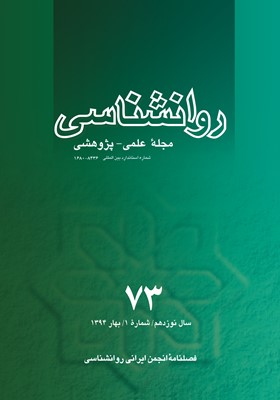نقش میانجی اهداف پیشرفت در رابطه بین نیاز به شناخت و درگیری شناختی: اثر بافت تعلل ورزی
محورهای موضوعی : روانشناسیرضا قربان جهرمی 1 , الهه حجازی 2 , جواد اژه ای 3 , محمد خدایاری فرد 4
1 - دانشگاه تهران
2 - دانشگاه تهران
3 - دانشگاه تهران
4 - دانشگاه تهران
کلید واژه: نیاز به شناخت اهداف پيشرفت درگیری شناختی تعلل ورزی تحصیلی,
چکیده مقاله :
هدف از پژوهش حاضر تعیین نقش میانجی اهداف پیشرفت در رابطه بین نیاز به شناخت و درگیری شناختی بر حسب تعلل ورزی دانش آموزان بود. برای اين منظور 268 نفر (161 دختر و 107 پسر) از دانش آموزان پایه سوم دبیرستا نهای دولتی شهر شیراز به روش نمونه گیری خوشه ای چند مرحله ای انتخاب شدند و به پرسشنامه ای خودگزارشی متشکل از خرده مقياس های نیاز به شناخت، مقیاس اهداف پیشرفت، مقیاس درگيري شناختي و مقیاس تعلل ورزی تحصیلی پاسخ دادند. روش اجرای پژوهش، توصیفی و با توجه به بررسی روابط میان متغیرها در قالب مدل علی تحلیل مسیر، طرح پژوهش همبستگی انتخاب شد. نتايج پژوهش بطور كل ی نشان داد که در یک بافت تحصیلی تعلل ورزی، نیاز به شناخت از طریق واسطه گری اهداف پیشرفت بر راهبردهای شناختی عمیق دارای اثر غیرمستقیم، مثبت و معنی دار؛ در حالی که بر راهبردهای شناختی سطحی دارای اثر غیرمستقیم، منفی و معنی دار است. یافته ها همچنین بیانگر آن بود که اثر مستقیم نیاز به شناخت بر اهداف تبحری معنی دار و مثبت و بر اهداف رویکرد- عملکرد و اهداف اجتناب- عملکرد معنی دار و منفی است. در ضمن، اثر هر یک از اهداف پیشرفت بر راهبردهای شناختی، سطحی و عمیق متفاوت بود.
The aim of the present study was investigating the mediating role of achievement goals in the relationship between need for cognition and cognitive engagement based on students’ academic procrastination. 268 third grade high-school students (161 female & 107 male) from high-schools in Shiraz city were selected through multistage cluster sampling and answered to a set of self-report questionnaire consisted of Need for Cognition Scale (NCS), Achievement Goals Scale (AGS), Cognitive Engagement Scale (MSLQ), and Academic Procrastination Scale (PASS). The research method was descriptive and correlation research design to study the relationship between variables in causal model of path analysis framework. The results generally showed that in an academic procrastination context, need for cognition had significant positive indirect effect on deep cognitive strategies through the mediation of achievement goals; however, this effect on shallow cognitive strategies was significant, but negative and indirect. The findings demonstrated that the direct effect of need for cognition on mastery and goals was significantly positive; but this effect on performance-approach and performance-avoidant goals were significantly negative. The effect of each of the achievement goals on shallow and deep cognitive strategies were different.


